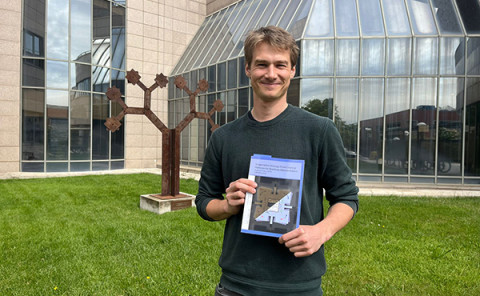Lukas Weituschat is defending his thesis: "Nothing compares to the excitement of witnessing the physical evidence of theoretical works"

Lukas Weituschat has everything ready, but he is still nervous: on April, 29th, he is defending the work he has been developing during the last few years: his PhD thesis, which is entitled Temperature Sensing: From Classical Photonics to Quantum Optomechanics. He joined the Material Science Institute of Madrid (ICMM-CSIC) when Daniel Ramos Vega, his thesis director, founded the Optomechanics Lab, and previously had worked at the IMN in the group of Pablo A. Postigo Resa, who is also his tutor.
"I was surprised by the number of German speakers and grateful for the friendliness of the quite international community in both institutes", explains Weituschat, who will always remember "the interesting conversations on all sorts of topics that I had during my time in these two places". Actually, he recognized that we doubt about coming to Madrid: "I had the choice between Madrid and Tarragona. Even though I love the vastness of the sea, I got to like Madrid with its international community and closeness to the mountains", he says.
How would you explain your research to a non-scientific audience?
It involves the interaction between light and matter on the nanoscale to sensitively gauge changes in the material and its surroundings. Optomechanics in particular, offers an effective way to transduce the mechanical vibrations in matter to optical waves which enables the development of quantum-limited sensors.
What are the main applications of your research? Could you give us an example?
The main objective of my research was, as the title states, the development of an optical temperature sensor for room temperature and cryogenic applications. During my PhD, the objective changed slightly to evolve the topic of Optomechanics, a promising and interesting subject that has been proven to be an efficient interface between classical physics and the quantum world, making it also useful for many future quantum applications.
What are the lessons you had learnt here? which one do you value the most?
Probably, discovering how powerful computational simulation can be in terms of understanding and innovating new devices, and how it can offer a unique perspective, especially in the realm of nano-scale phenomena. However, nothing quite compares to the excitement of witnessing the physical evidence of such theoretical work.
How do you think this experience will contribute to your training and to your future?
It underlines my research achievements and provides me with confidence in the expertise I gained throughout the years. Moreover, the connections I've made through working abroad offer exciting prospects to join and collaborate with other international research groups, allowing me to grow professionally and personally on many layers.
What are your plans once you finish your PhD?
Firstly, try to relax. Afterward, at least in the short term, I will join the photonics group of the University of Rochester, NY, that has been collaborating with us during the past years.
Why did you become a scientist? Who have been your role models?
I find it really amazing how science has influenced societies over the course of human history. I'm genuinely happy to be part of this journey and to learn even just a little bit about it. Also, I'm too curious and research often leaves us with more questions than it answers, making it hard to resist.
Instituto de Ciencia de Materiales de Madrid (ICMM)
Sor Juana Ines de la Cruz, 3
Cantoblanco, 28049
Madrid, España
Telephone: (+34) 91 334 90 00
Email: @email
Communication Office: @email

Acknowledge the Severo Ochoa Centres of Excellence program through Grant CEX2024-001445-S/ financiado por MICIU/AEI / 10.13039/501100011033

Contacto | Accesibilidad | Aviso legal | Política de Cookies | Protección de datos